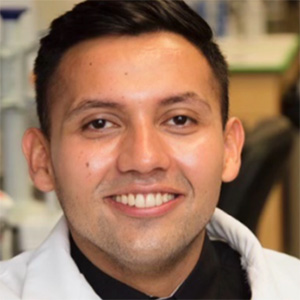
Omar Lujano Olazaba
Program: Joint Doctoral Program in Cell & Molecular Biology
Date: Thursday, May 29, 2025
Time: 12:00 pm
Location: Donald P. Shiley BioScience Center Gold Auditorium
Recording: Watch defense on YouTube
Committee Members
- Dr. Carrie D. House (Chair), SDSU
- Dr. Angelica Riestra, SDSU
- Dr. Parag Katira, SDSU
- Dr. David Schlaepfer, UCSD
- Dr. Karl Willert, UCSD
Abstract
High-grade serous ovarian cancer initially responds to chemotherapy but frequently relapses with chemoresistant disease, potentially driven by cancer stem-like cells (CSCs) that share many attributes with conventional stem cells.
TWEAK–Fn14–NF-κB signaling regulates integrin αVβ3 expression on CD117⁺ ovarian CSCs, with RelA promoting ITGAV and RelB promoting ITGB3 expression, indicating roles for classical and alternative NF-κB signaling. Given αVβ3’s role in stress responses, chemotherapy resistance, and matrix adhesion, we investigated its involvement in CSC survival and tumor repopulation within chemotherapy-altered stroma.
Our in vitro and in vivo data show chemotherapy increases fibroblast vitronectin and fibronectin production and promotes TWEAK–Fn14–NF-κB–mediated αVβ3 expression, supporting stress-tolerant CSC survival. αVβ3⁺ cells exhibit greater metastatic ability in chemotherapy-altered tissues, and relapse models show enrichment of αVβ3⁺ cells and mesenteric growth mediated by RelB.
Inhibition of RelB, αVβ3, and αVβ5 during chemotherapy administration eradicates αVβ3⁺ stress tolerant cells, inhibits omental burden, and significantly prolongs survival, highlighting new potential therapeutic targets for ovarian cancer.

